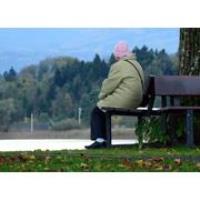
Older people are especially vulnerable to loneliness and social isolation. While life can get busy and hectic for many, it is still important to check in with aging loved ones who may be feeling lonely and isolated.
Common reasons for becoming socially isolated include:
- getting older or weaker
- no longer being the hub of the family
- leaving the workplace
- the deaths of spouses and friends
- disability or illness
“By understanding what social isolation is, catching it early on and getting help if needed, it can increase the likelihood that an aging adult can continue to age safely at home for the future.”
It’s one of the many reasons loneliness has become a problem at both the beginning and end of our life span. In a study published in May in the journal Psychological Science, researchers found that loneliness follows a U-shaped curve, starting from young adulthood, self-reported loneliness tends to decline as people approach midlife only to rise again after the age of 60, becoming especially pronounced by around age 80.
In the study, which looked at data waves spanning several decades, starting as early as the 1980s and ending as late as 2018, participants at either end of the age spectrum were more likely to agree with statements such as: “I miss having people around me” or “My social relationships are superficial.”
There are ways to overcome loneliness as an older person, even if you live alone and find it hard to get out. If you're feeling down and alone, it's normal to think nobody wants to visit you. But often friends and family will appreciate you inviting them to come and spend some time with you. Having a chat with a friend or relative over the phone can be the next best thing to being with them in person.
Getting involved in local community activities will vary according to where you live so check to see what's in your local area. Getting involved in community activities is great for your mental health. Fill your diary, it can help you feel less lonely if you plan the week ahead and put things in your diary to look forward to each day.
- a walk in the park
- going to a local coffee shop
- going to the library
- taking a class at your local sports centre
- going to the cinema
- visiting a museum
- Get out and about
Home Instead provides services to ageing adults in their own homes and is approved by the HSE. Its CAREGivers help clients maintain their independence by assisting them with activities of daily living such as personal care, meal preparation, laundry, shopping, and light housekeeping.
To find out more about Home Instead Waterford call 051 333966 or 058 75298 or visit www.homeinstead.ie



